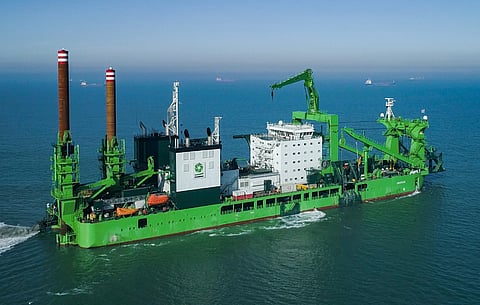

Belgium-based marine contractor DEME has taken delivery of a new cutter suction dredger (CSD) from Dutch shipyard Royal IHC.
The builder said Spartacus is the world's largest self-propelled CSD, with an LOA of 164 metres, a beam of 34 metres, a moulded depth of 10 metres, and a maximum draught of seven metres. It was designed jointly by DEME, Royal IHC, and Vuyk Engineering Rotterdam.
The CSD is capable of dredging at depths of as much as 45 metres with the aid of a discharge pipe with a diameter of 1,200 millimetres, 72-metre-long spuds, and a 2,550-tonne heavy cutter ladder that can be controlled from the bridge by a single operator.
The dredger also boasts four main engines that can be powered by different types of fuel including LNG, diesel, and heavy fuel oil, ensuring greater operational flexibility and making it what Royal IHC claims is the first CSD to be powered by LNG. The two auxiliary engines meanwhile have dual-fuel technology.
The total installed power is at 44,180 kW. Up to 12,000 kW of power can be supplied to the cutterhead, thus enabling Spartacus to cut harder soils at higher speeds not possible with older CSDs. DEME said the pumping power is increased to 25.5 MW to enable dredged material to be discharged over more than 10 kilometres. These abilities are made possible with the aid of a power generation and distribution system supplied by Bakker Sliedrecht. The system includes an ABB liquid-cooled multi-drive system, which Bakker Sliedrecht said has considerable power density for its size.
The CSD also has 14 cutterheads of six distinctly different designs that cover each soil type from fine sand to hard rock. The dredger will be capable of operating in remote locations with limited infrastructure, thanks to its fuel autonomy and its accommodation spaces that can house up to 72 personnel and are supported by air cushions for improved comfort. Also, the ability to operate on low-emission fuels such as LNG is in fulfilment of DEME's aim of minimising the adverse impact on the environment that dredging operations might otherwise impose, according to company CEO Luc Vandenbulcke.
The dredger also has a waste heat recovery system that can convert heat from the exhaust gases into electrical energy. There is also an onboard workshop with a vibration-insulated floor, making it possible for maintenance and repair of the cutterheads to be carried out even as dredging operations are underway.
Spartacus is currently working on its first project, the Abu Qir Port project in Egypt. The project, which has a scheduled completion of 2023, will involve the reclamation of 1,000 hectares of new land as well as channel deepening works with an estimated 150 million cubic metres of material to be dredged.
| Spartacus | |
| SPECIFICATIONS | |
| Type of vessel: | Cutter suction dredger |
| Flag: | Belgium |
| Owner: | DEME, Belgium |
| Designer: | DEME, Belgium; Royal IHC, Netherlands; Vuyk Engineering Rotterdam, Netherlands |
| Builder: | Royal IHC, Netherlands |
| Length overall: | 164 metres |
| Beam: | 34 metres |
| Draught: | 7.0 metres |
| Depth: | 10 metres |
| Main engines: | 4 x 11,045 kW |
| Auxiliary engines: | 2 |
| Generators: | Bakker Sliedrecht |
| Dredging equipment: | 14 x cutterheads; discharge pipe, 1,200 mm; heavy cutter ladder |
| Other equipment installed: | ABB multi-drive system; waste heat recovery system; spuds |
| Interior fitout/furnishings: | Air-cushions for accommodation spaces |
| Type of fuel: | LNG; diesel; heavy fuel oil |
| Accommodation: | Workshop |
| Crew: | 72 |
